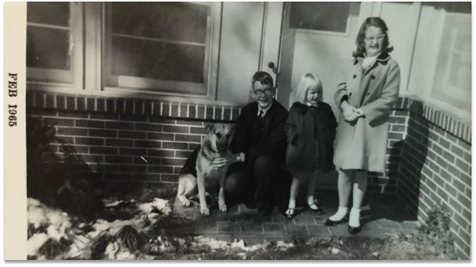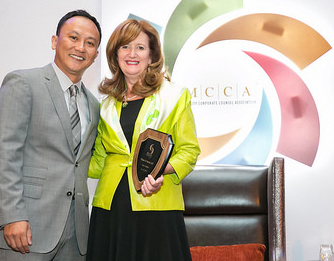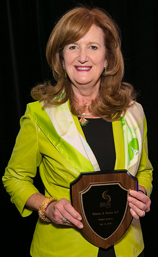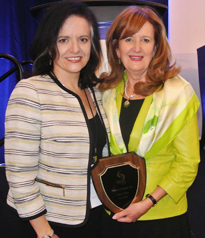© 2017 The Texas Lawbook.
By Janet Elliott
HOUSTON (March 29) – With $3 billion in potential pollution fines on the line, Houston litigator Paula Hinton showed Harris County jurors a photo of herself from 1965.
No, she told them, she was not the adorable little blonde with the Dutch-boy haircut; she was the gawky preteen wearing cat-eye glasses, Hinton recalls with a laugh.

It was a lighthearted moment during opening statements. It also was the moment when she planted the defense theory: that in 1965 — when paper mill waste containing dioxin was buried in pits on the banks of the San Jacinto River — it was a different era with different rules.
“That both humanized her to the jury, but also conveyed the point that we were talking about something that happened many decades ago,” said her co-defense counsel Barrett Reasoner, noting the risk that such a stunt could come across as hokey.
Hinton, a partner at Winston & Strawn, is known for connecting with juries, simplifying complex issues and resolving stalled disputes. She is in the prime of a career that has included many pro bono cases and longstanding work to encourage women lawyers.
It’s no surprise that Hinton could pull off the courtroom demonstration. After all, she is the proud daughter of Alabama trial lawyer James F. Hinton, who once brought two coconut pies to a courtroom to question a condemnation expert about the comparative value of the pie with a piece missing.
 “She can use her Alabama southern charm to relate to a broad array of people,” says Melanie Gray, a Winston partner who has tried cases with Hinton. “But dealing with opposing counsel and cross-examination, she is tenacious and strong.”
“She can use her Alabama southern charm to relate to a broad array of people,” says Melanie Gray, a Winston partner who has tried cases with Hinton. “But dealing with opposing counsel and cross-examination, she is tenacious and strong.”
During the 2014 pollution fines case brought by Harris County, Hinton represented Waste Management subsidiary McGinnes Industrial Maintenance Corp. To further explain what she saw as the unfairness of her client’s situation, she compared it to that of a driver being assessed penalties for 40 years of running a stop sign that was just placed at the corner yesterday.
“This was a very sophisticated operation for the time, approved by Harris County,” Hinton told jurors. “Don’t let anybody tell you that this was a fly-by-night operation where they were slipping out the back door and dumping it down the drain or onto somebody else’s property.”
Hinton and Reasoner, who represented Waste Management Inc., persuaded state District Judge Caroline Baker to toss two-thirds of the government’s damage claims. The remaining claims were settled for $29.2 million – less than one percent of the amount sought by the plaintiffs – just before closing arguments were scheduled to begin.
Hinton’s handling of the MIMC case has added to her reputation as one of Houston’s top litigators. It was especially notable because she was brought into the case just a few months before trial, when MIMC’s lead outside counsel unexpectedly died.
Steve Morgan, general counsel for Waste Management, says he wasn’t comfortable that other lawyers at that firm could proceed without their team leader.
“We were desperate to find someone who could quickly get up to speed and who had the right temperament and skill set,” Morgan says. “Paula’s name immediately came to mind.”
Morgan had known Hinton when both worked at Akin Gump in the 1990s. In addition to her courtroom presence, he admired her record of bringing other women and minorities to client meetings and trial teams.
“They’re not sitting back at the office doing research and I respect her for that,” he says.
Breaking Second Glass Ceiling
Later this year, Hinton expects to be back in a courtroom for MIMC, this time defending her client over claims of personal injury and property damage related to the San Jacinto waste pits. That case could become one of the largest environmental class action lawsuits in Texas history.
Hinton is also one of the lead lawyers for CPB Contractors, a giant Australian corporation that is suing Houston-based KBR for $1.4 billion for alleged tortious interference with a contract involving a multibillion-dollar liquefied natural gas project.

Hinton joined Chicago-based Winston & Strawn in 2013, drawn to the firm’s focus on commercial litigation. After pushing through a mid-career period where her retainers lagged behind her male competitors, Hinton finds herself in demand at age 62.
“At 55, I would have said there was a lull. Clients were going and hiring men rather than older women, but that has completely turned around in the last four years,” she says. “I am as busy as I’ve ever been.”
In 2013, Hinton successfully protected the NFL Players Association in a discovery dispute over a survey of players regarding their team’s medical staff. She succeeded in removing the case from a Dallas County Court at Law to federal court and raised defenses that included the Texas Anti-SLAPP law. A team doctor who was planning a defamation suit against the association voluntarily dismissed his proceeding.
Clients and co-counsel regularly turn to Hinton for action on stalled cases. Within three months of being brought into a three-year old franchise dispute by Re/Max of Texas, Hinton was able to convince a Harris County judge to compel arbitration.
She had barely set foot at Winston when the firm’s pro bono counsel asked her to help the Texas Civil Rights Project in a long-fought case that raised novel issues of privacy concerning a lesbian student. The TCRP was representing the student’s mother in a federal civil rights suit stemming from a 2009 incident in which the then-16-year-old softball player was allegedly “outed” by two coaches employed by Kilgore ISD.
The case had survived a limited interlocutory appeal to the U.S. Court of Appeals for the Fifth Circuit and was headed to trial. Hinton assembled a team from the firm and hired local counsel, launching into an intense period of depositions and document review. Less than two weeks before the trial, the school district agreed to pay $77,000 to the student and implement employee training conducted by lawyers from the LGBT Section of the State Bar of Texas.
Melanie Gray, part of Hinton’s team on the pollution fines case, says Hinton’s charm is not limited to jurors. Gray says she somehow manages to keep things light at the most stressful times in a trial. The positive atmosphere helped Gray, who was operating outside her usual comfort zone of federal bankruptcy.
“Every now and then she would just look over at me at the counsel table and say, ‘This is just like giving birth. We’re going to get through this, we just don’t have any choice.’ It was intense but we had so much fun,” Gray recalls.
What’s Best for the Client
In the combative environment of commercial litigation – where fees rack up faster than a retiree feeding the penny slots – Hinton knows that the battle can sometimes be avoided.
 When headstrong clients want to rush to the courthouse, she imagines how they will feel when their legal bills arrive. Could costly litigation be avoided with a facilitated discussion?
When headstrong clients want to rush to the courthouse, she imagines how they will feel when their legal bills arrive. Could costly litigation be avoided with a facilitated discussion?
“We don’t always have to fight. Sometimes what we have to do is talk,” says Hinton. “I want them to know they tried everything they could for a business solution before we go forward.”
About half will agree to talk. In high-stakes money fights, Hinton knows that emotions can run as high as in family court.
“I never view talking as weakness and if the other side views my talking as weakness then they are underestimating me,” Hinton says with a confident laugh.
She has applied this philosophy to some pro bono cases. In late 2012, she was contacted by the National Women’s Law center to help a young nursing student who had been ridiculed by a professor who refused to excuse her pregnancy-related absences. Instead of filing suit, Hinton says she drove to the university and met with the school’s general counsel, whom she suspected was unaware of the title IX violation.
She was right. After hearing about the situation, the university agreed to let the student finish her last two semesters tuition-free and trained its faculty and staff on Title IX requirements for pregnant students.
Alabama Roots Run Deep
Hinton has felt at home in a courtroom from a young age. She often tagged along with her father, a solo practitioner whose cases ranged from petty crimes to First Amendment rights.
“I was truly the little red-headed girl who was his shadow,” recalls Hinton of her childhood in Gadsden, Alabama. “I sat in judges’ laps while he tried cases. I went to the county jail on Sunday mornings while he visited clients. I would be in my Sunday school attire and eat biscuits with the trustees while he visited clients up and down the row. Things you could never consider today.”
Jimmie Hinton accepted clients that other lawyers refused, including the local adult bookstore and massage parlor owners. When he died in 1984 in his 50s “they said at his funeral that he was legal services before there was legal services,” says Hinton.
Her mother, Juanita Weems, was a champion debater at the University of Alabama, who became a schoolteacher. The daughter of uneducated cotton mill workers, Weems told of being taunted as a “lint-head.”
“I was exposed to people with a lot of heart,” Hinton says. “They always helped others. So, I love jury work. There’s nothing I like better than talking to a jury in voir dire.”
 Partial to bright colors, jewelry and long hair, Hinton has been known to ditch her navy suits on occasion. She recalls a late 1990s federal court case in Birmingham where a jury consultant from the northeast questioned her jade jacket.
Partial to bright colors, jewelry and long hair, Hinton has been known to ditch her navy suits on occasion. She recalls a late 1990s federal court case in Birmingham where a jury consultant from the northeast questioned her jade jacket.
“He said you can’t wear that in front of a jury,” she recalls. “I told him ‘I most certainly can. I’m from 40 miles up the road; and here in North Alabama they like their women to look like women.’”
Hinton also ignored his warning not to say “mama” in her opening statement, silently vowing to always hire jury consultants who are familiar with local customs.
Learning From V&E’s Best
Embracing her father’s advice to seek a “lace curtain” firm, after receiving her law degree from the University of Alabama, she sent a cold-call resume to Vinson & Elkins. In 1981, she became the second woman in the firm’s commercial litigation group where her mentors included Harry Reasoner, Jim McCartner and Ewing Werlein.
“I was very, very fortunate to have people like that to assist me in my years as a young lawyer,” Hinton says.
She laughs about the time Rufus Wallingford, from rival firm Fulbright & Jaworski, stood up to cross-examine her about attorney’s fees at the end of a three-month trial. Seated in the witness box was a hugely pregnant Hinton.
“He looks at me nine months pregnant and he looks at the jury over in the box and said, ‘Oh, never mind,’ and sat down,” says Hinton.
Wallingford later told her there was nothing to be gained by questioning her that day, a lesson for Hinton that sometimes the best thing to do is be polite.
In 1989, shortly after her son’s birth, Hinton was offered a partnership opening Akin Gump’s litigation practice.
“That was a very good move for me, being in a smaller office of a major firm,” she says. “I got lots more opportunities to first-chair more quickly as a ninth-year lawyer than I would have at the mother ship.”
An encounter with Harry Reasoner at an Anti-Defamation League luncheon led her back to the mother ship in 2001.
“I’m a great admirer of Paula,” says the elder Reasoner. “She has the courage and personality to stand up in any kind of forum and represent a client and herself well.”
Mentoring Women at Winston
In 2013, Hinton took her three decades of litigation experience to Winston’s Houston office. She cites two factors: the Chicago-based firm’s lack of a mandatory retirement policy and its focus on the courtroom when many firms were turning to more lucrative specialty work.
“I get the emphasis on litigation with a longer run,” Hinton says.

Winston managing partner Tom Fitzgerald tapped Hinton to lead the firm’s women leadership program. She initially suggested he get a younger woman partner to fill the role; but Fitzgerald said he knew she would get the job done.
“I said, ‘Fitz, I’m going to have conditions. My two retirement homes are purchased and I will only take on this responsibility if I will have the power, the money and the complete backing of you for the initiatives and changes I would want to make,’” recalls Hinton.
Hinton has worked with colleagues, including Gray, over the past 18 months on policies to foster the hiring, advancement, retention and promotion of the firm’s women and minority lawyers. She requires lawyers serving as mentors to foot some of the program costs upfront, money which will be returned if they fulfill their commitments.
“Instead of buying tables to a lot of events, we’re refocusing our efforts on the true development of our lawyers internally,” she says.
Like many of her male peers, Hinton has no intention to quit. Her two retirement homes are paid for but she truly believes her dad’s lesson: that the law is a calling.
“I love what I do, and they’re still paying me.”
© 2017 The Texas Lawbook. Content of The Texas Lawbook is controlled and protected by specific licensing agreements with our subscribers and under federal copyright laws. Any distribution of this content without the consent of The Texas Lawbook is prohibited.
If you see any inaccuracy in any article in The Texas Lawbook, please contact us. Our goal is content that is 100% true and accurate. Thank you.
